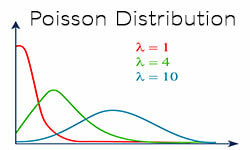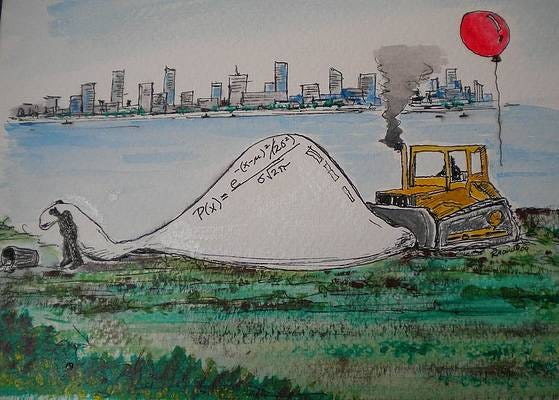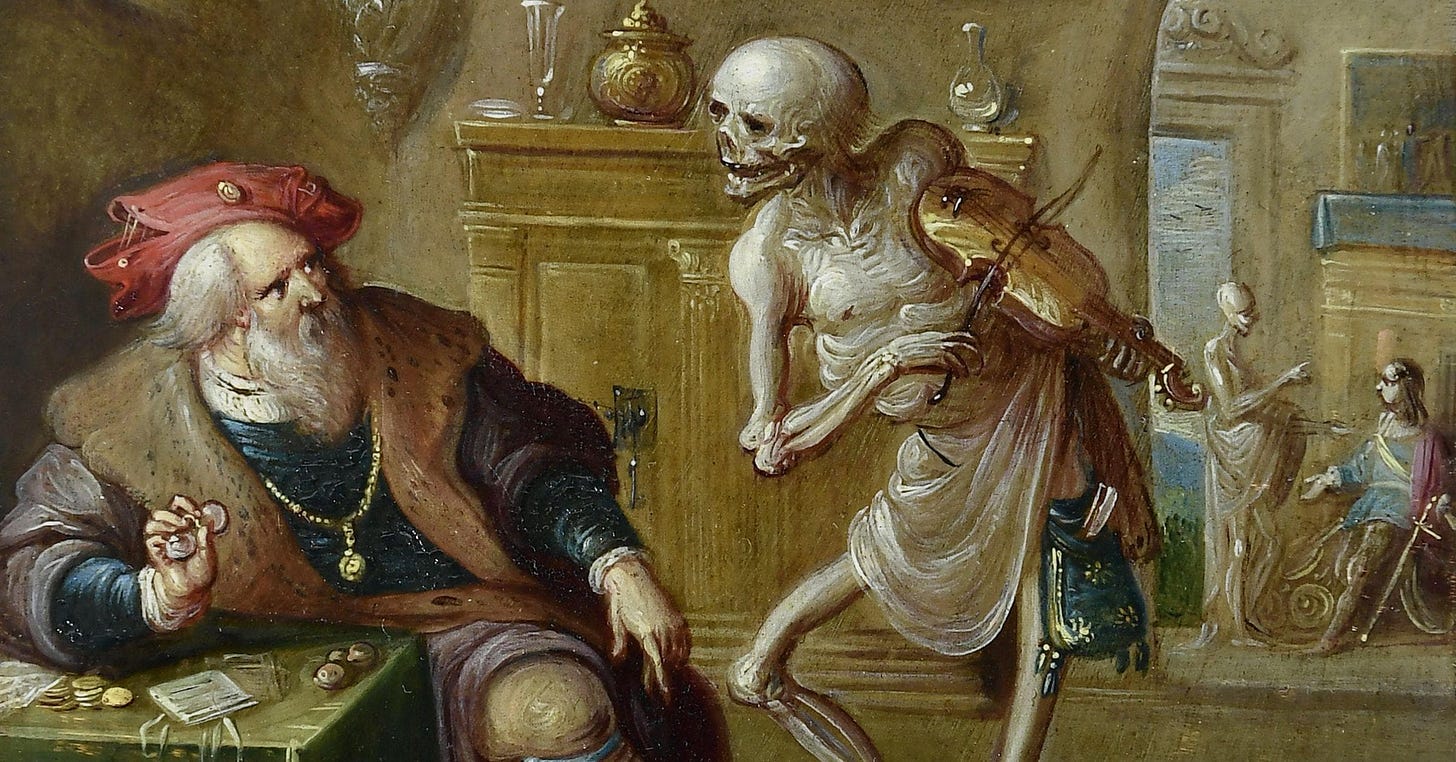Gravity's Rainbow - Part 1 - Chapter 9: Servants to the Margin
Analysis of Gravity's Rainbow, Part 1 - Chapter 9: Poisson Distributions
Roger and Jessica were last seen taking Pointsman to meet Spectro, driving off toward home. Now, we join them — Jessica mid-nightmare with the eyes of captured children watching over her, Roger still unphased by the horrors and sadness around him, their house empty to anyone but themselves, littered with daily refuse. Upon awaking for good Jessica notes the scattered wastes, the tracks of still living creatures who she cannot see, and thinks that if only there were others with them, maybe they could be whole. Despite their love for one another, the mere act of individual love is not enough. She, and she hopes the both of them, need people. And not only do they need people, they need peace. Though Jessica, still knowing nothing but the war, would settle for some excitement as long as death were not a factor — bombs without their victims, if such a thing is possible. Jessica thinks now of the war as “the great struggle of good and evil the wireless reports every day” (54). There is a great dose of naivete in her, attributing good and evil to entities greater than the suffering populations — the bombers are evil of course, the bombed are not, but her attributions are placed on continents, sides of the war, not the lowly people dying as a byproduct. Though, as we will see, her views fly far further than simple margins, making her one of our few points of hope in these early chapters.
Roger attempts to explain the Poisson distribution to her as he has done to many — a map of their city, split up into equal sections, points identifying bomb strikes in specific areas, all following that same pattern: plug in a number to the equation, and you can predict the next location. Roger is a believer, taking the equation and the statistical method as a whole to be his god, though it is apparent that there is something going on here. Are the rockets following the distribution because their trajectory truly is subject to that pattern as other random instances are, or are they being launched according to the pattern itself, entirely unrandom but appearing as such? And since we know there is a connection between Slothrop and the rockets, how does the equation account for this other variable? But nonetheless, Roger believes.
Though, even with this blinkered belief in equations, there is something to Roger’s line of thinking that surpasses that of people like Pointsman, for “Pointsman can only possess the zero and the one” (55). On or off, pure binary structure, whereas Roger can at least see the world between these numbers (neither, unsurprisingly, are looking Beyond these values just yet). What do these mindsets leave us with? There is the inability to account for the human or the abstract mind. Everything is shunted off to possibility or inevitability. If the rocket is bound to strike here next, then who are we to say something different or attempt to stop it? According the the equation, it was always bound to strike. The idea is disturbing to Pointsman, for he wonders, how can anything occur without a set cause, without a specific reaction to something else? It is another mindset falling into the world that they, as scientists or mathematicians, have built around them. They are now prey to the equations and methods that they have derived which, while they do have their many important uses, are often just methods to justify or prove beliefs that they have already held before. Pointsman even equates the unlinked events as being "the end of history," (56) a la Francis Fukuyama.1 He cannot comprehend that there is something between zero and one, that while all events stem from others, there is still a randomness within them, the ability for a person to change something. And Roger, holding the belief in the randomness, does not see the cause and effect, only the chance encounter. The two of them together could possibly come to a better conclusion, but they still would not see Beyond. For now though, Roger will see that everyone is "Equal in the eyes of the rocket" (57). Like Slothrop, when he saw it emerge from the clouds in Chapter 4, the rocket, to Mexico, has become a God. It speaks to him in the only metaphor he knows: randomness and indiscriminate cruelty.
This view leads to his label, being said by Prentice to fall into "Cheap nihilism" (57). Even though the rest of The White Visitation’s beliefs may touch on the absurd — "survival after death, communication mind-to-mind, prophesying, clairvoyance, teleportation" (58) — at least they have something to look at beyond randomness or cause and effect. And while Jessica may not comprehend his ideas of Poisson distributions, she holds an important place in her heart for humanity, wishing she could protect him from that randomness falling out of the sky. Perhaps she could be his savior — someone who allows him to see the Beyond. She cannot even remember before the war, questioning Roger into the night — "What was it like?" (59) — and only receiving mutterings in return: "Just . . . just damned silly, that’s all" (59). Even so, she has a vision of peace time; she sees Christmases where families would again sit happily, not prey to the paranoia of a random strike, or cities that shine with lamplight rather than fire.
For tonight though, fire is all that they will know. A rocket strikes in the near distance as they begin to lose themselves in each other. Their ears ring. A train, invisible, holding all the Preterite on their way to empty hotel rooms, emerges in her mind as replacement to those Christmas lights and familial love. They cannot touch each other, and Death looms above them smiling.
This has been one of my favorite chapters in the early book so far. Roger and Jessica’s relationship is so beautifully written in all their counterpoints. Next week, we have another perfect chapter. If you have not read the book before, prepare yourself — it’s quite the doozy, but brilliant nonetheless.
As for me, I have officially finished the novel for the third time, leaving me broken mentally once again. And starting Monday, I will be back at work. I hope and think I will keep up with the posts on a weekly basis, but give me a touch of leeway if I have to skip a week every once and a while! I’ll always let you know ahead of time if that will happen, but I think/hope it will not.
Looking forward to attempting to decipher next week’s chapter!
Up Next: Part 1 — Chapter 10
Check him out if you haven’t heard of him. Quite the psychopath.





Sad how far the war has lowered Jessica's standards for happiness. But that's all she knows...
I am ashamed to admit that I imagine Roger and Jessica Rabbit every single time I think about Roger Mexico and Jessica. For me, they will always be cartoons of themselves, drawn in that distinct style of Roger Rabbit. I had to look up and find out that the first Roger Rabbit texts came out in 1981, so it wasn't a reference by Pynchon, and I haven't really even paid attention to the movie, and yet every one of there scenes is animated in my mind. Same pattern: the man has a last name, the woman doesn't, even though they're not married. Maybe Jessica has a last name.... of course she does, it's Swanlake. But Mexico's called Mexico, and so syntactically he has two names, just like Roger and Jessica Rabbit. Before I could stop myself, I had and subb'ed in the sexiest woman in cartoon history for her in my mind, and it worked perfectly, so it stayed, as anachronous as it is. what can I do? nothing. They seem unserious compared to the rest of the book for me; especially Roger Mexico reads to me as a buffoon -- who actually believes in that statistics stuff anyway?